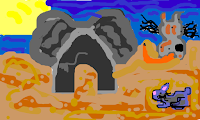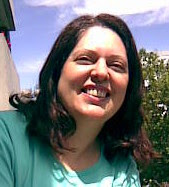On Thursday 25, thanks to OpenVideoAlliance, I watched live a very interesting conference that Lawrence Lessig was giving at Harvard School on "Fair use, politics and online video".
After having attended a few webinars an other online presentations, I've taken to taking down notes pretty much in the same way as when I'm in the same room as the presenter. My comments here will come from what I remember and what I wrote down during the talk and will have, of course, been sifted through the filter of my own interpretation.
The first thing that caught my attention was the word
PASSIVITY.
I've been so immersed in learning about the possibilities of the Web 2.0 that I no longer associate as easily as before the concept of technology with passivity. So the question that ensued was "who took it away?". Now we're talking; there was passivity, now there isn't so much -there's been a change. But how did that passivity come to be? Well, partly because creativity was being consumed (the Web has some great sites), but consuming ends there -it doesn't create. And so a context of [online]
CULTURAL CONSUMPTION began to take shape.
Around 2004 this cultural passivity that technology had created and maintained for so long suffered a change because of -according to Lessig- a revival of the Reading and Writing (R/W) culture. Technology was now making it possible to
REMIX content. One of the examples shown was mixing Anime with audio; another one, a video featuring political leaders mixed with a love song in the background. Lessig considers another big change took place in 2006 with YouTube. Of course. YouTube increased participation: now anyone could make a video and upload it, comment on other people's videos, email their friends with links to those videos...
And a
REMIX CULTURE emerged as a new kind of amateur culture.
Now, the topic of the talk was not participation in itself but discussing fair use and politics in relation to online video -amateur and professional. Lessig took us to the early
Disney productions, which made use of works in the Public domain...PD was fine for Disney...that is, until Disney saw what could happen to their own productions and a
Copyright Act was passed so now "no one can do to Disney what Disney did to the Grimm brothers". And yet
Disney's "Little Einsteins" today are taking classical music and remixing.
Lessig's talk opened up my eyes and mind to the concept of remixing. Until listening to him I hadn't considered remixing as creating; it was using other people's works and putting them together.
Period. Legally and ethically, they were part of plagiarism or just plain copying to me.
Now I see it isn't. When I use Animoto, for example, and take some of my photos (or someone else's photos in the PD), select PD/CC licensed music to go with them and choose the order in which I want to use them, as well as whether I want a particular image or piece of a video clip to have more prominence, let the program manipulate the images and then I give that video a
title -I'm creating. The key for understanding this to me is the fact that I want to give my clip a title -if it were just putting together different works that someone else did and trying to make them pass as my own, why do I feel that choosing a title is so important? A title, as a category, is at the highest level of the
superstructure of a work (text, video, anything) -most titles are not final until the whole work is finished.
A title is mine, it
embodies the synthesis of what I want to convey with my work. Semantically, and borrowing Van Dijk's terms, it is at the highest level of a text's
macrostructure.
When I'm asked to write essays and I'm not allowed to choose a title for it, I feel something's missing.
Lessig sees amateur remixing as celebrating freedom and reincorporating it. He stresses, however, the importance of the existence and enforcement of a copyright law -for professionals, for those who profit financially from their remixes using other people's works. He sees progress in this direction coming from the Court (in the US) but not from Congress.
Then he moves on to the issue of responsibility; who's responsible for making this change -from passivity back (or forward) to creating? Immediately after this Lessig cites the (real) example of a captain that was too drunk to run his ship to make the point that if you are there and do nothing, you are responsible too. The "good people" need to step up and do something -let go of the passivity and improper dependencies that destroy.
He encourages amateurs to use their talent and technology to see and change the dynamics by which creativity is being stifled. According to Lessig, copyright does no good when it limits amateur creativity and exhorts to create and enforce a copyright law that focuses on commercial entities that are using and profiting from amateur creativity.
He looks at
2 ways of remixing:
(1) the one used by (for example) G.Lucas for Star Wars: he reserves all rights for himself even if you created, for example, the music that went into your remix. That, Lessig says, is treating people not as creators but as "people doing stuff for you".
Remix way #2 gives the copyright to the remixers, thus treating them as creators and promoting more amateur creativity.
Now as I write this I ask myself: why is it so important to have amateur creativity? Isn't it enough to pick and choose from commercially available creations?
And I think of teaching. I can go into my classroom and follow recipes time and time again, with different groups. Or I can see my students as individuals who, together with myself, form a particular group, with particular needs and interests, with feelings that change over the semester or the school year or even a week. I can remix the coursebook with them, I can ask them to think which part they want to change and why -what's useful, what could be tweaked to make it more interesting, what's fine as it is, what they'd like to bring in...
I could go into the classroom and set myself onto autopilot.
Or I can go into the classroom and help students grow, think for themselves, and express their ideas and emotions, and prepare them to continue learning when I'm not around anymore, to become independent thinkers and interpret the world in their own way and be aware that they're doing so.
Prepare them to collaborate with others and appreciate the good in other people's artifacts.
To contribute to a more tolerant and inclusive culture and society.















